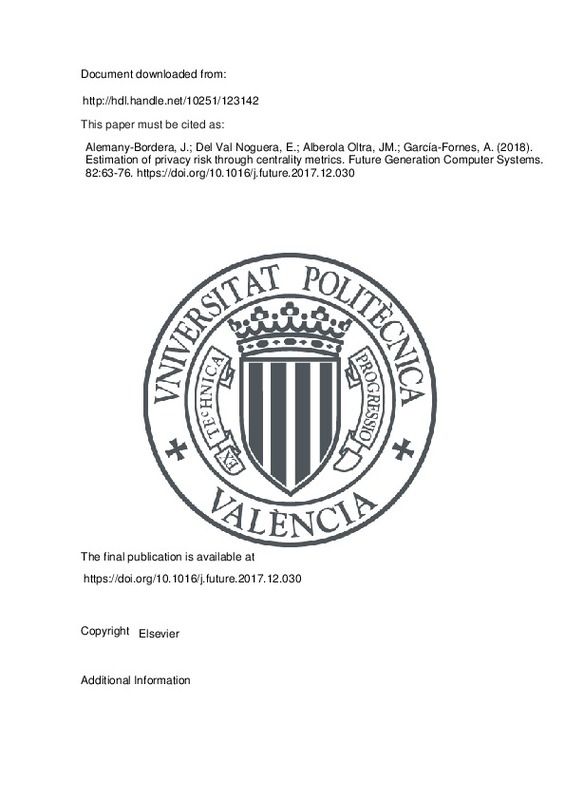JavaScript is disabled for your browser. Some features of this site may not work without it.
Buscar en RiuNet
Listar
Mi cuenta
Estadísticas
Ayuda RiuNet
Admin. UPV
Estimation of privacy risk through centrality metrics
Mostrar el registro sencillo del ítem
Ficheros en el ítem
| dc.contributor.author | Alemany-Bordera, José
|
es_ES |
| dc.contributor.author | Del Val Noguera, Elena
|
es_ES |
| dc.contributor.author | Alberola Oltra, Juan Miguel
|
es_ES |
| dc.contributor.author | García-Fornes, A
|
es_ES |
| dc.date.accessioned | 2019-07-03T20:02:51Z | |
| dc.date.available | 2019-07-03T20:02:51Z | |
| dc.date.issued | 2018 | es_ES |
| dc.identifier.issn | 0167-739X | es_ES |
| dc.identifier.uri | http://hdl.handle.net/10251/123142 | |
| dc.description.abstract | [EN] Users are not often aware of privacy risks and disclose information in online social networks. They do not consider the audience that will have access to it or the risk that the information continues to spread and may reach an unexpected audience. Moreover, not all users have the same perception of risk. To overcome these issues, we propose a Privacy Risk Score (PRS) that: (1) estimates the reachability of an user¿s sharing action based on the distance between the user and the potential audience; (2) is described in levels to adjust to the risk perception of individuals; (3) does not require the explicit interaction of individuals since it considers information flows; and (4) can be approximated by centrality metrics for scenarios where there is no access to data about information flows. In this case, if there is access to the network structure, the results show that global metrics such as closeness have a high degree of correlation with PRS. Otherwise, local and social centrality metrics based on ego-networks provide a suitable approximation to PRS. The results in real social networks confirm that local and social centrality metrics based on degree perform well in estimating the privacy risk of users. | es_ES |
| dc.description.sponsorship | This work is partially supported by the Spanish Government project TIN2014-55206-R and FPI grant BES-2015-074498. | es_ES |
| dc.language | Inglés | es_ES |
| dc.publisher | Elsevier | es_ES |
| dc.relation.ispartof | Future Generation Computer Systems | es_ES |
| dc.rights | Reconocimiento - No comercial - Sin obra derivada (by-nc-nd) | es_ES |
| dc.subject | Privacy | es_ES |
| dc.subject | Social networks | es_ES |
| dc.subject | Information sharing | es_ES |
| dc.subject.classification | LENGUAJES Y SISTEMAS INFORMATICOS | es_ES |
| dc.title | Estimation of privacy risk through centrality metrics | es_ES |
| dc.type | Artículo | es_ES |
| dc.identifier.doi | 10.1016/j.future.2017.12.030 | es_ES |
| dc.relation.projectID | info:eu-repo/grantAgreement/MINECO//TIN2014-55206-R/ES/PRIVACIDAD EN ENTORNOS SOCIALES EDUCATIVOS DURANTE LA INFANCIA Y LA ADOLESCENCIA/ | es_ES |
| dc.relation.projectID | info:eu-repo/grantAgreement/MINECO//BES-2015-074498/ES/BES-2015-074498/ | es_ES |
| dc.relation.projectID | info:eu-repo/grantAgreement/AEI/Plan Estatal de Investigación Científica y Técnica y de Innovación 2013-2016/TIN2017-89156-R/ES/AGENTES INTELIGENTES PARA ASESORAR EN PRIVACIDAD EN REDES SOCIALES/ | es_ES |
| dc.rights.accessRights | Abierto | es_ES |
| dc.contributor.affiliation | Universitat Politècnica de València. Departamento de Sistemas Informáticos y Computación - Departament de Sistemes Informàtics i Computació | es_ES |
| dc.description.bibliographicCitation | Alemany-Bordera, J.; Del Val Noguera, E.; Alberola Oltra, JM.; García-Fornes, A. (2018). Estimation of privacy risk through centrality metrics. Future Generation Computer Systems. 82:63-76. https://doi.org/10.1016/j.future.2017.12.030 | es_ES |
| dc.description.accrualMethod | S | es_ES |
| dc.relation.publisherversion | https://doi.org/10.1016/j.future.2017.12.030 | es_ES |
| dc.description.upvformatpinicio | 63 | es_ES |
| dc.description.upvformatpfin | 76 | es_ES |
| dc.type.version | info:eu-repo/semantics/publishedVersion | es_ES |
| dc.description.volume | 82 | es_ES |
| dc.relation.pasarela | S\349967 | es_ES |
| dc.contributor.funder | Agencia Estatal de Investigación | es_ES |
| dc.contributor.funder | Ministerio de Economía, Industria y Competitividad | es_ES |







![[Cerrado]](/themes/UPV/images/candado.png)

